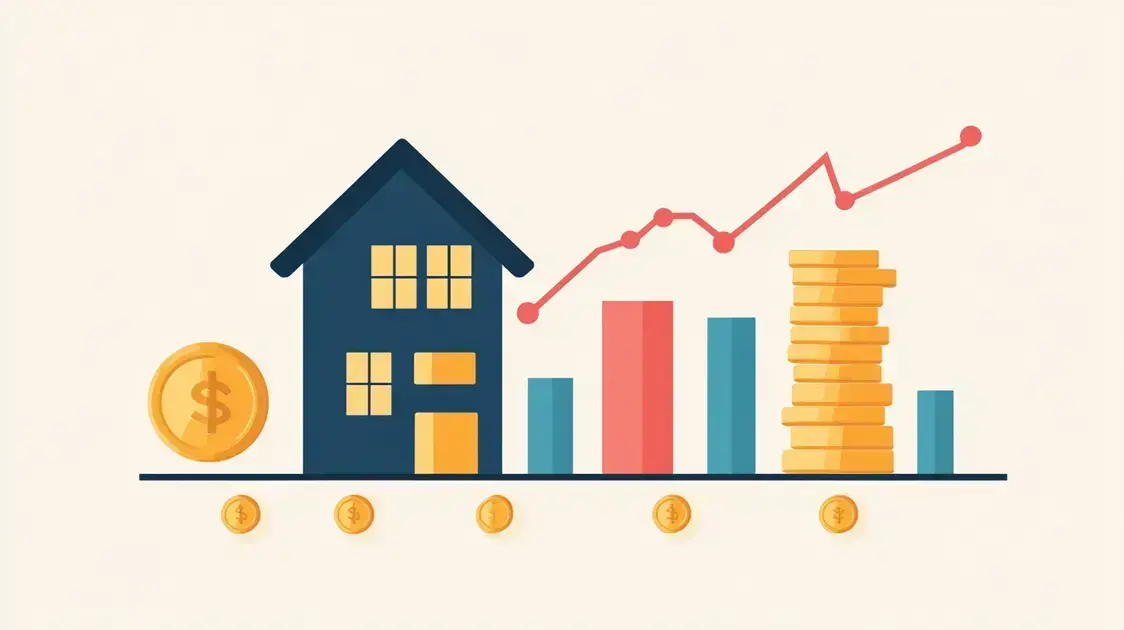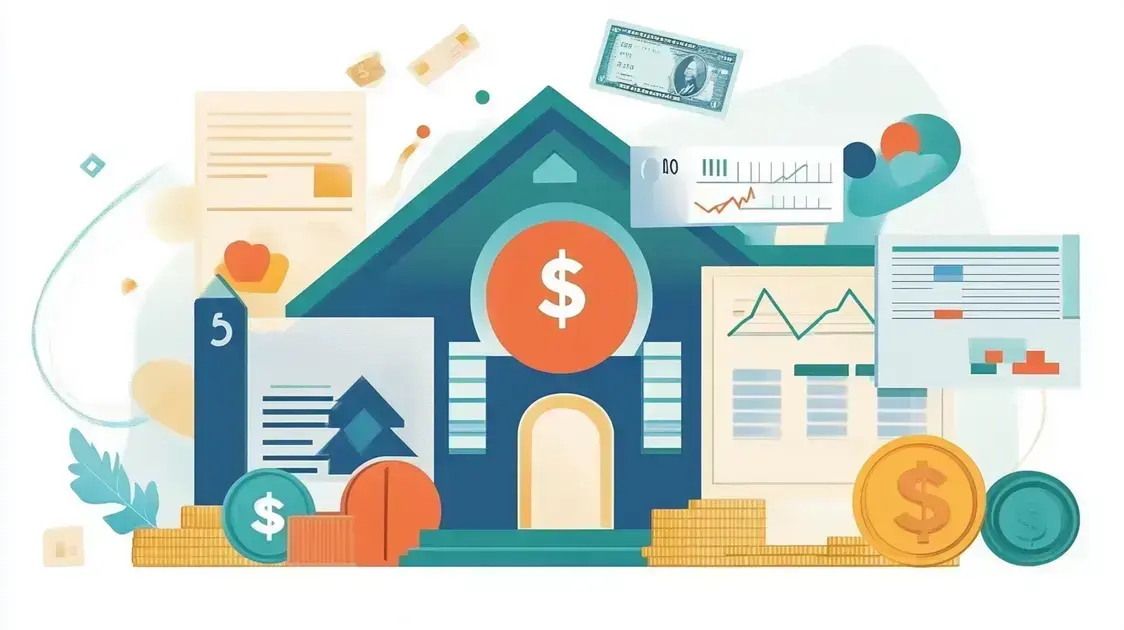What Increases Your Total Loan Balance is an important question for anyone managing debt. Your loan balance can rise unexpectedly if you’re not careful, impacting your financial health. Understanding how this happens can help you take control.
The total balance includes the principal, interest, and any fees or changes to your loan terms. Small changes, like interest rate hikes or missed payments, can quickly add up. Awareness is key to avoiding surprises.
By staying on top of your loan balance and knowing what increases it, you can make smarter decisions. Want to learn more about how these factors impact your finances? Keep reading to find out.
Understanding Total Loan Balance
Understanding your total loan balance is crucial to managing your finances effectively. Your total loan balance is the sum of all outstanding amounts you owe to lenders.
This includes the principal, which is the original amount borrowed, as well as any accrued interest and any additional fees that may have been added over time. Understanding What Increases Your Total Loan Balance can help you better navigate your financial obligations.
Components of Total Loan Balance
To grasp how your total loan balance is calculated, it’s important to know its main components:
- Principal: This is the initial amount you borrowed and have yet to repay.
- Interest: This is the cost of borrowing money, calculated on the unpaid principal. It typically accumulates over time and could be impacted by the loan’s interest rate.
- Fees: Any additional costs charged by the lender, such as origination fees, late payment fees, or maintenance fees, can also increase your total loan balance. Recognizing these factors can help you understand What Increases Your Total Loan Balance and how to manage them effectively.
Why Understanding Your Balance Matters
Knowing your total loan balance helps you stay on top of your financial obligations. It enables you to:
- Evaluate your financial health by understanding how much you owe compared to your income.
- Create a budget that includes all loan payments, ensuring you can meet your obligations without strain.
- Make informed decisions about refinancing options or paying down loans more aggressively.
A clear grasp of your total loan balance will empower you to take control of your finances, but keep in mind that different factors may contribute to changes over time.
Factors That Increase Loan Balances
Several factors can increase your loan balance over time. Being aware of these factors will help you manage your finances better and plan ahead. Understanding What Increases Your Total Loan Balance is essential for making informed financial decisions.
1. Interest Rates
If your loan has a variable interest rate, fluctuations can significantly affect your total loan balance.
A rise in the interest rate means that you will owe more on your loan due to increased interest charges. Even a small change can add up to a large amount over time. This is a key aspect of What Increases Your Total Loan Balance.
2. Missed Payments
When you miss loan payments, your lender may charge you a late fee. This fee adds to your total loan balance, making it more difficult to pay off the loan in the long run. Consistently missing payments can also increase the overall cost of your loan.
3. Additional Fees
Loans often come with various fees, such as origination fees or service charges. If these fees are not accounted for in your initial calculations, they can lead to an unexpected increase in your total loan balance.
4. Loan Modifications
Sometimes, borrowers need to restructure their loans for better terms or lower payments. While this can provide immediate relief, it can also increase your total loan balance if the modifications extend your loan term, resulting in more interest paid over time.
5. Capitalization of Interest
In some types of loans, especially student loans, unpaid interest can capitalize, which means that it gets added to your principal balance. This can significantly raise your total loan balance if not managed carefully.
6. Borrowing More
If you take on additional loans or increase the amount of your existing loan, your total loan balance will naturally rise. This is particularly common when borrowers tap into their credit lines or take additional personal loans for other expenses.
7. Change in Loan Terms
Changing the terms of your loan, such as extending the repayment period, can also impact how much you owe. While lower monthly payments may seem beneficial, extending the term might lead to higher total interest payments and a larger loan balance.
Impact of Interest Rates

The impact of interest rates on your total loan balance is significant and can change over time. What Increases Your Total Loan Balance is often closely tied to interest rates, as they determine how much extra money you will pay in addition to the principal amount you borrow.
How Interest Rates Work
When you take out a loan, the lender sets an interest rate, which can be either fixed or variable:
- Fixed Interest Rate: This rate remains the same throughout the loan term. You know exactly how much interest you will pay, which helps in budgeting.
- Variable Interest Rate: This rate can change throughout the loan term based on economic conditions. If rates increase, so does your total loan balance, making it crucial to understand What Increases Your Total Loan Balance.
Effects of Rising Interest Rates
If interest rates rise, borrowers will face higher monthly payments if they have a variable-rate loan. Each month, a larger portion of your payment goes toward interest, which adds to your total loan balance. This can make it more expensive to pay off your loan.
Long-Term Impact
Over the life of a loan, higher interest rates can lead to substantial additional costs. You might pay thousands of dollars more in interest, which increases your total loan balance. For example, a 1% increase in interest rates could add hundreds to your balance across several years.
Impact on Budgeting
Higher interest rates can also affect your budgeting plans. If you are paying more toward interest, you might have less money for other expenditures. Understanding how interest rates affect your total loan balance helps you make better financial decisions.
Strategies to Handle Changes
To mitigate the impact of rising interest rates, consider refinancing to a fixed-rate loan during periods of low rates. This can lock in your interest costs and prevent further increases in your total loan balance.
Role of Fees and Charges
The role of fees and charges is crucial in determining your total loan balance. These costs can silently add to what you owe, making it essential to understand how they affect your overall financial picture.
Types of Fees
Borrowers may encounter various fees over the life of a loan:
- Origination Fees: This fee is charged by the lender for processing a new loan. It is often a percentage of the loan amount and can significantly increase your total balance at the start.
- Late Payment Fees: If you miss a payment, you could incur a late fee. This not only raises your total loan balance but also can negatively impact your credit score.
- Service Fees: Some loans come with ongoing service fees for account maintenance. These fees accumulate over time and can increase your total balance.
- Prepayment Penalties: If you pay off your loan early, some lenders impose a penalty fee. This may seem counterintuitive, but it can add to your total costs.
How Fees Affect Your Loan Balance
Fees can significantly inflate your total loan balance. For example, if you have a loan of $10,000 with a 2% origination fee, you will start with a total balance of $10,200. Understanding these fees helps you see the true cost of borrowing and understand What Increases Your Total Loan Balance.
Impact on Monthly Payments
Fees also influence your monthly payments. A higher total loan balance means more interest charges, which can lead to higher payments. Being aware of the various fees can help you budget effectively and avoid surprises.
Negotiating Fees
In some cases, borrowers can negotiate fees with lenders. Asking to waive or reduce certain fees can lower your total loan balance and make repayment easier, reducing What Increases Your Total Loan Balance.
Importance of Reading the Fine Print
Always read the loan agreement carefully to identify any fees and charges. This ensures you are aware of any potential costs that could increase your total loan balance.
Loan Payment Terms Explained
Understanding loan payment terms is essential for anyone looking to manage their loans effectively. These terms outline how and when you will repay your loan, and they can significantly impact your total loan balance.
Types of Loan Payment Terms
Loan payment terms generally include:
- Loan Amount: This is the total amount borrowed that you will repay. It’s crucial to know this since it forms the basis of your monthly payments.
- Repayment Period: This is the length of time you have to repay your loan, usually stated in months or years. Common terms for personal loans are 1-5 years, while mortgages can stretch up to 30 years.
- Interest Rate: This is the percentage charged on the loan amount, which can be fixed or variable. The interest rate directly influences your monthly payments and total loan costs.
Monthly Payments
Your monthly payment is determined by several factors, including the loan amount, interest rate, and repayment period. Understanding how these elements work together helps you budget effectively.
Impact of Longer Terms
Choosing a longer repayment period can lower your monthly payments, making them more manageable. However, this also means you will pay more in interest over time, increasing your total loan balance.
Early Repayment Options
Many loans allow for early repayments without penalties. Paying off your loan sooner can save you money on interest. Understanding your loan’s prepayment policy is crucial for minimizing your total costs.
Loan Amortization
Loan amortization refers to how your payments are structured. In the early years of a loan, most of your payment goes toward interest. Over time, more of your payment will go toward the principal. This structure affects how quickly you reduce your total loan balance.
How Credit Score Affects Balances

Your credit score plays a crucial role in determining your financial health and can significantly impact your loan balances. Understanding how it affects your borrowing can help you manage your loans more effectively.
What is a Credit Score?
A credit score is a three-digit number that reflects your creditworthiness. It is based on your credit history, including payment history, amounts owed, length of credit history, types of credit used, and new credit inquiries. A higher score indicates that you are a low-risk borrower.
How Credit Scores Affect Loan Amounts
Lenders use credit scores to decide how much money they are willing to lend you. If you have a high credit score, you are likely to qualify for larger loan amounts. Conversely, a low credit score may limit your borrowing capacity, affecting your total loan balance and revealing What Increases Your Total Loan Balance.
Impact on Interest Rates
Your credit score directly influences the interest rate you receive on loans. Higher credit scores typically secure lower interest rates, which means you will pay less over time. For example, a borrower with a score above 700 may receive a rate of 4%, while another with a score below 600 might face a rate of 10%. Lower interest rates translate to lower total loan balances.
Fees and Charges Related to Credit Score
Borrowers with low credit scores may face additional fees from lenders, such as higher origination fees or insurance premiums. These costs can mount and contribute to an increased total loan balance, helping you understand What Increases Your Total Loan Balance.
Effects of Loan Applications
When you apply for loans, lenders perform a credit inquiry to check your score. Multiple inquiries can temporarily lower your credit score, which may affect your ability to secure future loans and can lead to higher balances due to less favorable terms.
Improving Your Credit Score
Improving your credit score can have a positive impact on your loan balances. By paying bills on time, reducing debt, and avoiding unnecessary credit inquiries, you can boost your score, qualifying for better loan terms and rates.
FAQ – Frequently Asked Questions about What Increases Your Total Loan Balance
What factors can increase my total loan balance?
Factors include interest rates, missed payments, additional fees, and changes in loan terms.
How does my credit score impact my loan balance?
A higher credit score can lead to lower interest rates and better loan terms, reducing your total loan balance over time.
What are the types of fees I might encounter on my loan?
Common fees include origination fees, late payment fees, and service charges, all of which can increase your total loan balance.
How can I manage my loan balance effectively?
Strategies include making extra payments, creating a budget, refinancing your loan, and setting up automatic payments.
What should I do if I miss a loan payment?
Contact your lender immediately to discuss options. Make up the payment as soon as possible to avoid additional fees.
Can refinancing my loan help reduce my balance?
Yes, refinancing can lower your interest rate and monthly payments, potentially reducing your total loan balance.


